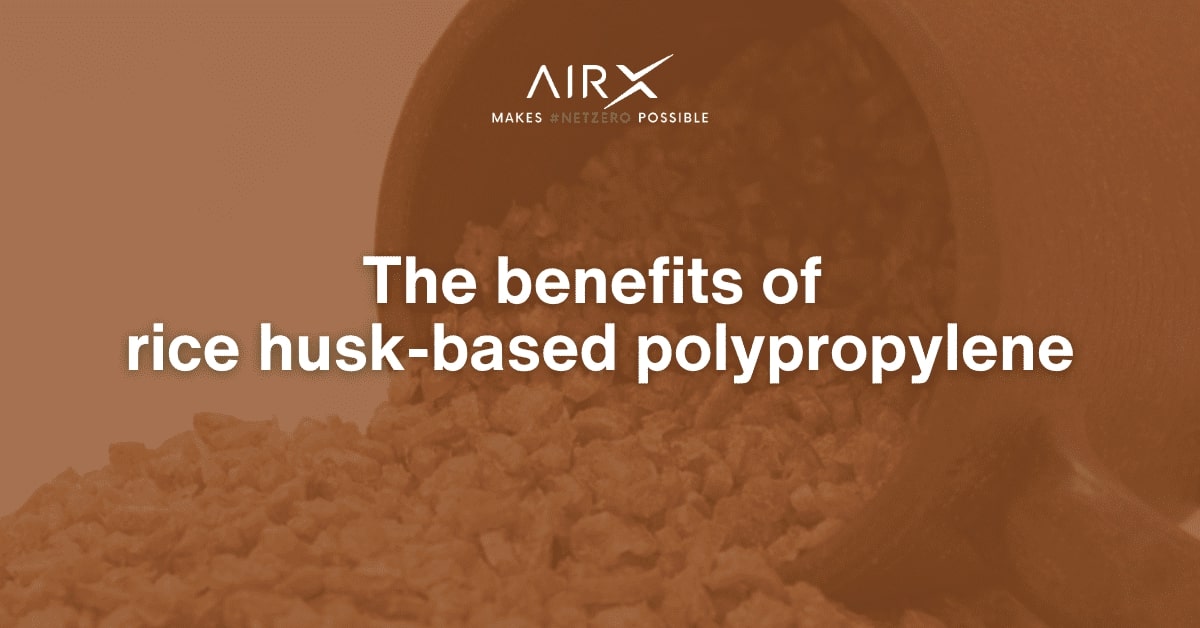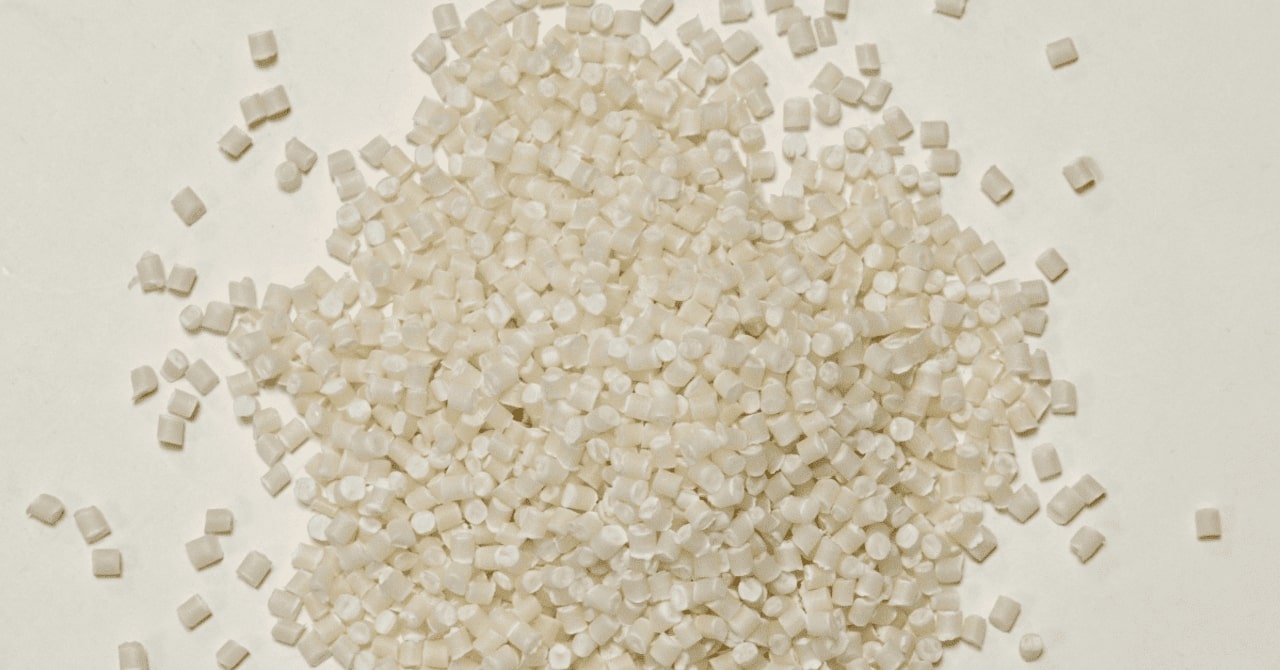Discover the benefits of rice husk-based polypropylene

In recent years, there has been a growing emphasis on sustainable and eco-friendly alternatives in various industries. One such innovation that has gained significant attention is the development of rice husk-based polypropylene, a material derived from agricultural waste.
This article will explore how the benefits of rice husk-based polypropylene extend to encompass both human health and business aspects.
1. What is Rice husk-based polypropylene?
Rice husk-based polypropylene is a kind of bio-based polypropylene, which is a type of polypropylene plastic that is derived from renewable biological sources. Unlike traditional polypropylene, which is derived from fossil fuels such as petroleum or natural gas, bio-based polypropylene products utilize feedstocks that are obtained from biomass, such as plants, agricultural crops, or organic waste materials.
Rice husk-based polyethylene from AirX is a biobased plastic that incorporates rice husk - a byproduct of rice milling, as a filler material. 
With the special properties, the utilization of rice husk in recycled polypropylene not only provides a valuable outlet for a waste material but also reduces the need for virgin fillers and reduces the carbon footprint associated with the production of polyethylene.
The benefits of rice husk-based polypropylene range in various aspects such as: human health, economy, environment and also businesses.
2. Benefits of Rice husk-based polypropylene
For Human health
Several potential benefits of rice husk-based polypropylene for human health can be listed as:
Reduced Chemical Exposure: Rice husk-based polypropylene is often free Reduced Chemical Exposure: RHP is often free from harmful additives commonly found in traditional polypropylene, such as phthalates or bisphenol-A (BPA). This benefits of Rice husk-based polypropylene reduce the risk of chemical leaching from products made with RHP, minimizing potential exposure to these substances.
Food Safety: Rice husk-based polypropylene can be used in food packaging applications, providing a safe and sustainable alternative. As it is derived from rice husks, a non-toxic agricultural waste, Rice Husk-Based Polypropylene offers a lower risk of contamination compared to traditional plastic packaging materials.
Skin Contact: Applications involving direct contact with human skin, such as medical devices or personal care items are also considered as effective benefits of rice husk-based polypropylene . RHP's composition, free from harmful additives, reduces the likelihood of skin irritations or allergic reactions.
Potential Allergen Reduction: Rice husks are not known to be common allergens, making RHP a potentially hypoallergenic material. This can be particularly beneficial for individuals with sensitivities or allergies to certain materials.
For Businesses
Furthermore, businesses also take into consideration the economic benefits of Rice Husk-Based Polypropylene.
Sustainability and Environmental Responsibility: Incorporating Rice Husk-Based Polypropylene into your products or manufacturing processes demonstrates a commitment to sustainability and environmental responsibility. It allows businesses to reduce their carbon footprint and reliance on fossil fuels, contributing to a greener and more sustainable image.
Cost Savings: The benefits of Rice Husk-Based Polypropylene also encompass cost savings. Rice husks are often considered agricultural waste and can be obtained at a lower cost or even for free, depending on the local rice production industry. Utilizing this readily available and affordable feedstock can help lower production costs.
Market Differentiation: Using Rice Husk-Based Polypropylene can help differentiate your products in the market. With the increasing demand for sustainable and eco-friendly alternatives, customers are more likely to choose products that are made with environmentally friendly materials like RHP. It allows businesses to tap into a growing market segment and gain a competitive advantage.
Regulatory Compliance: As governments and regulatory bodies prioritize environmental sustainability, using Rice Husk-Based Polypropylene can help businesses stay compliant with changing regulations and standards related to plastic waste reduction, renewable materials, and carbon emissions.
Customer Appeal: Consumers are becoming more conscious of the environmental impact of the products they purchase. By incorporating RHP into your products, you can attract environmentally conscious customers who actively seek sustainable options. This can lead to increased customer loyalty and positive brand perception.
Supply Chain Diversification: By offering an alternative source of raw materials, the benefits of Rice Husk-Based Polypropylene help reduce reliance on fossil fuel-based feedstocks. Diversifying the supply chain with renewable and locally available materials like rice husks can enhance business resilience and mitigate the risks associated with price fluctuations or supply disruptions of conventional materials.
Innovation and Research Opportunities: The development and utilization of Rice Husk-Based Polypropylene open doors for research and innovation in sustainable materials. Businesses can explore new product applications, optimize manufacturing processes, and collaborate with research institutions to further enhance the properties and functionalities of Rice Husk-Based Polypropylene, leading to potential breakthroughs and competitive advantages.
AirX, purchasing the purpose of providing high-quality plant-based carbon negative products, always searching and innovating the technique of bio-based products manufacturing. Our process and materials are ensured to be closely monitored, which adapt the needs of qualified finished products of our customers. Our bio-based materials offer the same functions of conventional plastics, but its environmentally friendly characteristics make them an ideal choice for partners, businesses looking for sustainable development. 
Contact us
AirX is the world’s first carbon-negative bio-material made from coffee grounds manufacturer.
We specialize in producing bio-based composites using recycled carbohydrates derived from by-products such as coffee grounds, coconut husk, husk, and bamboo. Our goal is to promote sustainability through the use of eco-friendly materials.
We are always here to help and provide the best service possible. If you have any questions or would like to receive advice and feedback directly from our sales staff, please do not hesitate to contact us. You can reach us through:
- Whatsapp: +84 969 742 950
- Email: [email protected]
We look forward to hearing from you!

